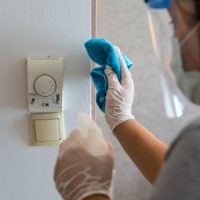Common Causes of Injuries Among Hotel Housekeepers

According to research, hotel workers in the United States of America are 40 percent more likely to suffer injuries at work than other service-sector workers in general. When people think of workers in the hotel industry who are likely to suffer occupational injuries, they often think of workers such as chefs/cooks, waiters, and waitresses. However, hotel housekeepers also face several hazards when on the job that can result in severe and fatal injuries. It is crucial for hotel housekeepers to familiarize themselves with some of the common ways they can suffer injuries. That way, they can be in a better position to prevent injuries. Below, we discuss some of the most common causes of injuries among hotel housekeepers.
#1: Repetitive Movements
Hotel housekeepers do a lot of repetitive work, such as making beds, vacuuming, and cleaning surfaces. The main risk of performing repetitive tasks is developing repetitive strain injuries that affect the arms, shoulders, elbows, knees, and other body parts. Examples of repetitive strain injuries that hotel housekeepers can develop include carpal tunnel syndrome, rotator cuff injuries, tendonitis, and bursitis.
#2: Lifting
Hotel housekeepers lift and move objects such as mattresses, cleaning equipment, and trash cans. The weight of these objects can lead to injuries. Also, if workers don’t use proper lifting techniques, it can result in serious injuries.
#3: Slips, Trips, and Falls
There are several opportunities for hotel housekeepers to slip, trip, and fall and sustain severe injuries. One of the most common causes of slip, trip, and fall injuries among hotel housekeepers is wet floors or surfaces. Other things that can cause a hotel housekeeper to slip, trip, and fall include clutter and obstacles, uneven flooring, stair safety issues, and poor lighting.
#4: Poor Ergonomics
Some of the cleaning tools and equipment that hotel housekeepers use are poorly designed and can result in awkward positions. Such tools and equipment can lead to musculoskeletal injuries.
#5: Space Limitations
When cleaning tight or small areas like the bathrooms, hotel housekeepers may be unable to move freely. They may have to work in awkward positions. This can increase the risk of sprains and strains.
#6: Workplace Violence
Another common hazard hotel housekeepers face that can result in severe or fatal injuries is workplace violence. Hotel housekeepers may encounter violent guests, resulting in physical harm.
#7: Poorly Maintained Equipment
It is crucial that the equipment used by hotel housekeepers, such as vacuum cleaners, is regularly inspected to ensure it is safe. Poorly maintained equipment can pose a safety risk. For example, a poorly maintained vacuum cleaner with exposed wires or damaged electrical components can cause electrical shock.
#8: Sharp Objects
Hotel housekeepers are at risk of being injured by broken glass. Needles and other sharp objects that can be found in trash cans also pose a danger to hotel housekeepers.
#9: Hazardous Chemicals
Some of the cleaning agents that hotel housekeepers work with contain hazardous chemicals that can pose health risks. Chemicals can cause, among other problems, skin irritation and respiratory issues.
Legal Help Is Available
After suffering a work-related injury as a hotel housekeeper in Vermont, you may be entitled to recover workers’ compensation benefits. Our skilled and dedicated Vermont workers’ compensation attorney at Sluka Law PLC can help you with your legal claim.
Source:
pre2020.iuf.org/w/sites/default/files/Occupational_Health_and_Safety_Standards_for_Housekeepers.pdf
